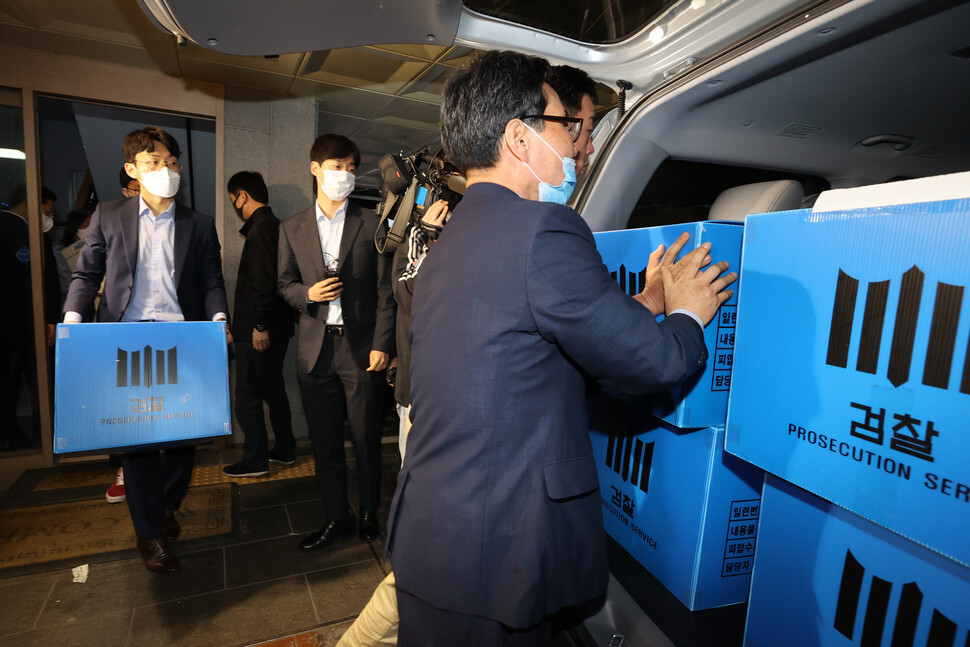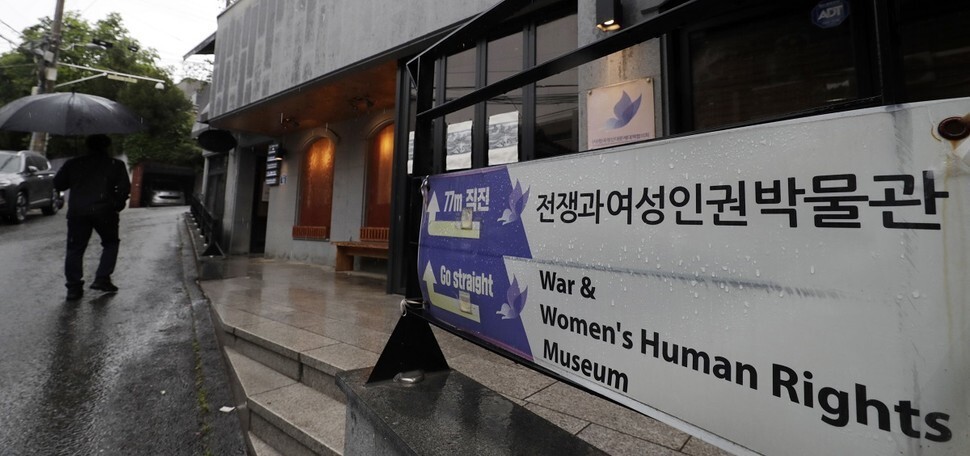hankyoreh
Links to other country sites 다른 나라 사이트 링크
S. Korean prosecutors raid offices of Korean Council just after Wednesday demonstration

On May 20, South Korean prosecutors raided a Korean nonprofit that advocates on behalf of the former comfort women. The raid defied expectations in its speed, timing, and method. It occurred on a Wednesday, when the Korean Council for Justice and Remembrance for the Issues of Military Sexual Slavery by Japan (Korean Council) holds its regular weekly demonstration.
Since the controversy over the Korean Council’s use of donations has spilled over into allegations about personal corruption by former council chair Yoon Mee-hyang (who was recently elected as a proportional representative for the Together Citizens’ Party), the prosecutors were expected to take a firm hand in their investigation, while still avoiding the day of the demonstration. But the prosecutors launched the surprise raid at 5 pm, immediately after the day’s demonstration was over. That departed from the typical procedure of executing a search warrant in the morning, indicating how seriously the prosecutors are taking this case.
The prosecutors were initially expected to focus on Yoon’s alleged personal corruption, which has been reported in the press. Since the Korean Council has agreed to undergo an external audit in order to address allegations about its accounting, it was thought that the prosecutors would wait for the results of the audit before deciding whether to launch an investigation.
But by targeting the Korean Council’s office on Wednesday, the prosecutors have shown that they’re determined to examine a full range of issues related to the Korean Council’s operations in past years, including the transparency of its project spending and the appropriateness of its accounting. That means the prosecutors’ investigation could extend beyond Yoon’s alleged personal corruption to the Korean Council as a whole.
Yoon was reportedly the only suspect listed on the prosecutors’ search warrant. Investigators are primarily looking into charges that Yoon committed embezzlement and breach of trust. Those charges appear in a complaint filed against Yoon in regard to her purchase of a house in Anseong, Gyeonggi Province, to serve as a shelter for the comfort women. But depending on how the investigation goes, not only Yoon but also other people who were involved in the property transaction could become targets of the investigation. In September 2013, Yoon was introduced to an architect surnamed Kim by Lee Gyu-min, a recently elected lawmaker with the Democratic Party and head of the Anseong Shinmun newspaper at the time. Yoon then signed a contract to purchase the house, which was registered under the name of an individual surnamed Han, who happens to be the wife of Kim, the architect.

Another major subject of the investigation is the donations that Yoon collected in personal bank accounts. Yoon used those accounts when raising funds for a number of events, including the funeral of former comfort woman Kim Bok-dong in January 2019. Using personal accounts meant that private funds were mixed with public donations, inevitably prompting allegations about embezzlement. These accounts can be traced to determine how the funds were used. That’s how the prosecutors plan to determine whether Yoon used those donations to cover the cost of her daughter’s studies in the US and to buy an apartment in Suwon through an auction in 2012.
Another big question in the prosecutors’ investigation is whether the Korean Council was aboveboard in its use of subsidies from the Korean government. The Korean Council aroused suspicions by only reporting 500 million won (US$406,075) in spending to the National Tax Service from the 1.3 billion won (US$1.1 million) it received in state subsidies from 2016 until the present. The prosecutors plan to confirm how all that money was spent to determine whether the spending lined up with project objectives.
By carrying out this compulsory investigation, the prosecutors may also be able to prevent the allegations surrounding the Korean Council from escalating into a political free-for-all. The parliamentary probe that the opposition party has proposed would be clearly limited in its ability to arrive at the actual truth. Allowing political bickering to continue without clearly addressing the allegations could cause serious harm to the comfort women movement as a whole.
But civic groups are also concerned that the prosecutors hope to dig up as much dirt as possible. They say that the prospect of prosecutors taking accounting irregularities as an excuse to launch a full-fledged investigation whenever they want could have a chilling effect on their activities.
By Chai Yoon-tae and Lim Jae-woo, staff reporters
Please direct comments or questions to [english@hani.co.kr]

Editorial・opinion
![[Column] Park Geun-hye déjà vu in Yoon Suk-yeol [Column] Park Geun-hye déjà vu in Yoon Suk-yeol](https://flexible.img.hani.co.kr/flexible/normal/500/300/imgdb/original/2024/0424/651713945113788.jpg) [Column] Park Geun-hye déjà vu in Yoon Suk-yeol
[Column] Park Geun-hye déjà vu in Yoon Suk-yeol![[Editorial] New weight of N. Korea’s nuclear threats makes dialogue all the more urgent [Editorial] New weight of N. Korea’s nuclear threats makes dialogue all the more urgent](https://flexible.img.hani.co.kr/flexible/normal/500/300/imgdb/original/2024/0424/7317139454662664.jpg) [Editorial] New weight of N. Korea’s nuclear threats makes dialogue all the more urgent
[Editorial] New weight of N. Korea’s nuclear threats makes dialogue all the more urgent- [Guest essay] The real reason Korea’s new right wants to dub Rhee a founding father
- [Column] ‘Choson’: Is it time we start referring to N. Korea in its own terms?
- [Editorial] Japan’s rewriting of history with Korea has gone too far
- [Column] The president’s questionable capacity for dialogue
- [Column] Are chaebol firms just pizza pies for families to divvy up as they please?
- [Column] Has Korea, too, crossed the Rubicon on China?
- [Correspondent’s column] In Japan’s alliance with US, echoes of its past alliances with UK
- [Editorial] Does Yoon think the Korean public is wrong?
Most viewed articles
- 1‘We must say no’: Seoul defense chief on Korean, USFK involvement in hypothetical Taiwan crisis
- 2N. Korean delegation’s trip to Iran shows how Pyongyang is leveraging ties with Moscow
- 3‘Weddingflation’ breaks the bank for Korean couples-to-be
- 4[Reportage] On US campuses, student risk arrest as they call for divestment from Israel
- 5Amnesty notes ‘erosion’ of freedom of expression in Korea in annual human rights report
- 6[Column] Park Geun-hye déjà vu in Yoon Suk-yeol
- 7Korea sees more deaths than births for 52nd consecutive month in February
- 8[Editorial] New weight of N. Korea’s nuclear threats makes dialogue all the more urgent
- 9Will NewJeans end up collateral damage in internal feud at K-pop juggernaut Hybe?
- 10[Guest essay] The real reason Korea’s new right wants to dub Rhee a founding father